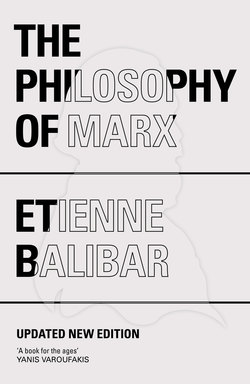The Philosophy of Marx

Реклама. ООО «ЛитРес», ИНН: 7719571260.
Оглавление
Étienne Balibar. The Philosophy of Marx
The Philosophy of Marx
Contents
Preface
Introduction to the New Edition:From Althusserian Marxism tothe Philosophies of Marx?Twenty Years After
1. Marxist Philosophy or Marx’sPhilosophy?
2. Changing the World: From Praxisto Production
3. Ideology or Fetishism: Power andSubjection
4. Time and Progress: AnotherPhilosophy of History?
5. Science and Revolution
Afterword:Philosophical Anthropology orOntology of Relations? Exploringthe Sixth Thesis on Feuerbach1
Appendix:The End of Politics orPolitics without End?Marx and the Aporia of‘Communist Politics’1
Notes
Bibliographical Guide
Отрывок из книги
New and Updated Edition
ÉTIENNE BALIBAR
.....
Did he succeed in this undertaking? In a sense, completely, since it is perfectly possible to argue that the only true subject is the practical subject or the subject of practice or, better still, that the subject is nothing other than practice which has always already begun and continues indefinitely. But does this get us out of idealism? Nothing could be less certain, precisely because, historically speaking, ‘idealism’ covers both the point of view of representation and that of subjectivity. In reality, what we have here is a circle or a theoretical interchange which functions in both directions. It is possible to say that, by identifying the essence of subjectivity with practice, and the reality of practice with the revolutionary activity of the proletariat (which is one with its very existence), Marx transferred the category of subject from idealism to materialism. But it is equally possible to assert that, precisely by so doing, he set up the permanent possibility of representing the proletariat to itself as a ‘subject’ in the idealist sense of the term (and hence, ultimately, as a representation or an abstraction by means of which the world, or the transformation of the world, is once again ‘interpreted’: is this not exactly what happened when, later, Marxist theorists, armed with the idea of class struggle, were to deduce from it a priori the ‘meaning of history’?).
There is nothing gratuitous about these dialectical games. They are closely linked to the history of the notion of revolution and, consequently, have a political aspect as well as a philosophical one. From the beginning of the modern period – that of the revolutions which are termed bourgeois, the Anglo-American and the French – the invention of the subject as the central category of philosophy, which relates to all fields of concrete experience (science, morality, law, religion, aesthetics) and makes possible their unification, is linked to the idea that humanity moulds or educates itself, to the idea that it gives itself laws and, therefore, finally to the idea that it liberates itself from the various forms of oppression, ignorance or superstition, poverty etc.10 And the generic subject of this activity always has two sides to it: the one theoretical, the other concrete and practical. In Kant, that subject was humanity; in Fichte it became at a certain point the people, the nation; and in Hegel, lastly, it was the historical peoples as successive embodiments of the ‘world-spirit’, i.e. the progress of civilization.
.....